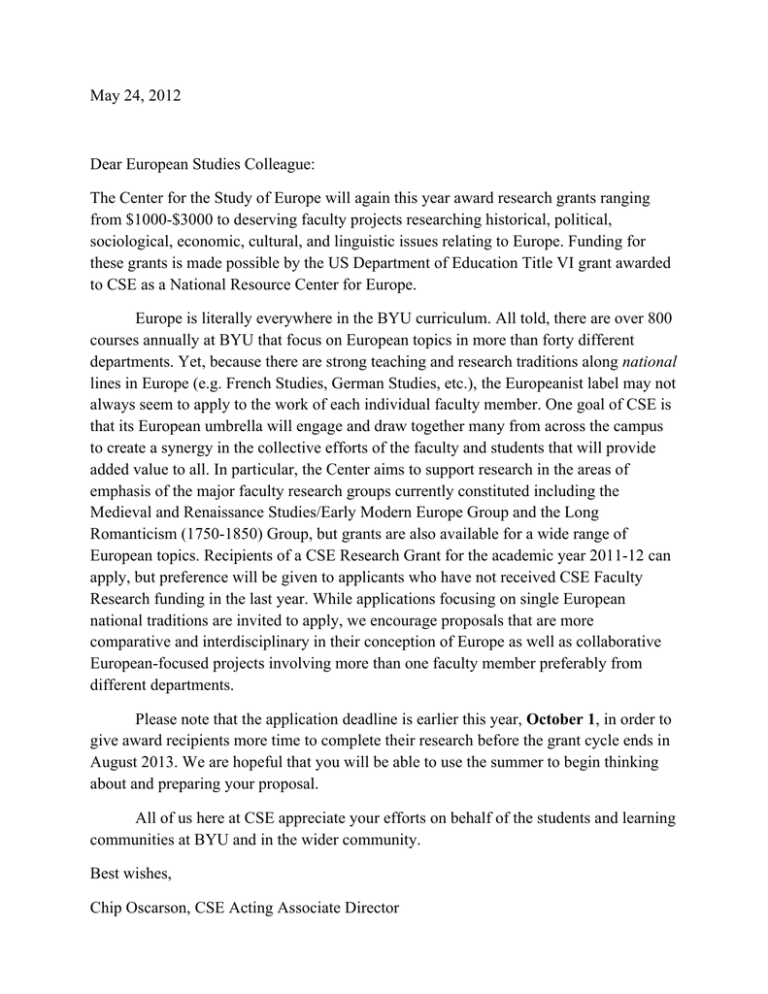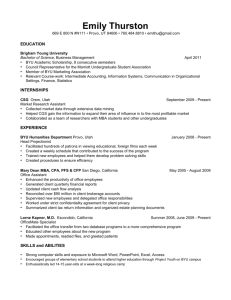May 24, 2012
advertisement

May 24, 2012 Dear European Studies Colleague: The Center for the Study of Europe will again this year award research grants ranging from $1000-$3000 to deserving faculty projects researching historical, political, sociological, economic, cultural, and linguistic issues relating to Europe. Funding for these grants is made possible by the US Department of Education Title VI grant awarded to CSE as a National Resource Center for Europe. Europe is literally everywhere in the BYU curriculum. All told, there are over 800 courses annually at BYU that focus on European topics in more than forty different departments. Yet, because there are strong teaching and research traditions along national lines in Europe (e.g. French Studies, German Studies, etc.), the Europeanist label may not always seem to apply to the work of each individual faculty member. One goal of CSE is that its European umbrella will engage and draw together many from across the campus to create a synergy in the collective efforts of the faculty and students that will provide added value to all. In particular, the Center aims to support research in the areas of emphasis of the major faculty research groups currently constituted including the Medieval and Renaissance Studies/Early Modern Europe Group and the Long Romanticism (1750-1850) Group, but grants are also available for a wide range of European topics. Recipients of a CSE Research Grant for the academic year 2011-12 can apply, but preference will be given to applicants who have not received CSE Faculty Research funding in the last year. While applications focusing on single European national traditions are invited to apply, we encourage proposals that are more comparative and interdisciplinary in their conception of Europe as well as collaborative European-focused projects involving more than one faculty member preferably from different departments. Please note that the application deadline is earlier this year, October 1, in order to give award recipients more time to complete their research before the grant cycle ends in August 2013. We are hopeful that you will be able to use the summer to begin thinking about and preparing your proposal. All of us here at CSE appreciate your efforts on behalf of the students and learning communities at BYU and in the wider community. Best wishes, Chip Oscarson, CSE Acting Associate Director CALL FOR CSE RESEARCH GRANT PROPOSALS 1. Focus of Grants Full-time BYU faculty members are invited to apply for grants from the Center for the Study of Europe to support research on historical, political, sociological, economic, cultural, and linguistic issues relating to Europe. We encourage (but do not require) applicants to think how they might work collaboratively with other BYU faculty members in their project. Especially welcome are proposals that deal with: • • • • • The idea of Europe (historical and contemporary) Cultural currents and phenomena that originated in Europe Dialects and minority languages in Europe Definitions of an “European identity” Political and social aspects of European integration 2. Geographical Area Under stipulations of a Title VI grant from the US Department of Education, BYU's Center for the Study of Europe supports projects that focus on Europe/Western Europe, including Turkey. Since other Title VI centers support research on Russia and the former Soviet Union, research on these countries will not be considered for funding from our Center with the exception of the three Baltic states that have joined the European Union and NATO (thus, Russia, Belarus, Ukraine, Moldova and the Caucasus states are outside the boundaries of the grant). Proposals related to non-EU countries within the described boundaries are, of course, welcome. 3. Range of Grants and Restrictions The range of grants is flexible. It is expected that most grants will be from $1000 to $3000, though applications for other amounts will be considered if sufficiently justified. The Center has minimal funds to defray the costs of photocopying, supplies, and the purchase of books. Grant money cannot be used to hire RAs. 4. Funding Priorities Priorities will be given to proposals for: • • • Travel, archival research, and field studies that need to be conducted on site in European countries. Projects that have a solid chance of resulting in publication within three years after the funding has been awarded. Publication should be in the form of an article, book, or, under certain circumstances, a refereed electronic publication. While the presentation of research results at scholarly conferences is encouraged, the purpose of these grants is to produce scholarship that will result in publication. Projects that build connections between European scholars and/or scholarly institutions and that foster the possibility of exchange of scholars and students with BYU. 5. Format for Grant Applications Applications should be in narrative form and should not exceed three double-spaced pages. They should include the following information: 1. An overall description of the project. 2. The faculty member's qualifications to carry out this project, including work previously done in this area and publications (if any) on the proposed topic. 3. Plans for carrying out the project, including information on research location, existing contact with archives or other sites where material is located, connections to scholars or sources that have been or will need to be established, the length of time for which funding is needed, and other relevant information that demonstrates careful preparation. 4. A brief budget. 5. How the proposed grant relates to past or present funding for the same project. First-time applicants with new projects will be given the same consideration as those who seek partial funding for already existing projects that have received financial support from other sources. 6. Deadlines Grant applications must be received electronically by the Center for the Study of Europe by Monday, October 1, 2012. They may be emailed to Administrative Director, Lora Cook at lora.cook@byu.edu. Announcements of awards will be made by December 1, 2012.


